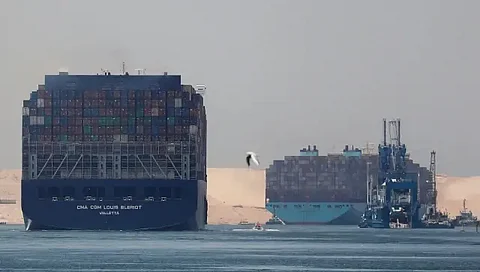

US helicopters thwarted an attack by Iran-backed Houthi militants on a Maersk container vessel in the Red Sea, sinking three boats and killing at least 10 fighters. The incident occurred around 0330 GMT as the attackers tried to board the Singapore-flagged Maersk Hangzhou. Maersk suspended all sailings through the Red Sea for 48 hours after the attack.
A Houthi spokesman claimed the attack was initiated because the ship’s crew ignored warning calls. The naval battle underscores the risk of regional escalation in fighting, particularly as Israel continues its relentless bombing campaign following a Hamas surprise cross-border attack. The Red Sea is crucial for global trade, handling about 12% of it and facilitating the movement of goods between Asia and Europe.
Operation Prosperity Guardian, launched by the United States on December 19, has garnered support from over 20 countries to safeguard ships in Red Sea waters near Yemen. The US has made it clear that it takes these threats seriously and is willing to take direct action to deter threats to freedom of navigation in the Red Sea. British officials have also expressed their commitment to holding malign actors accountable for unlawful seizures and attacks.
The BIMCO shipping association condemned the attacks and expressed gratitude to the US, French, and UK efforts, urging more states to support the coalition with naval assets and diplomatic pressure on the Houthis and their sponsors.
The Houthi movement, also known as Ansarallah (Supporters of God), is a significant player in the Yemeni civil war, which has been ongoing for nearly a decade. The movement traces its roots back to the 1990s when its leader, Hussein al-Houthi, initiated the "Believing Youth," a revival movement for Zaidism, a subsect of Shia Islam with a long history in Yemen.
Zaidis had historically ruled Yemen but faced marginalization under the Sunni regime that took power after the 1962 civil war. Al-Houthi's movement aimed to represent Zaidis and resist radical Sunnism, particularly Wahhabi ideas from Saudi Arabia. As a result, his closest followers became known as Houthis.
The movement gained momentum when Ali Abdullah Saleh, the first president of unified Yemen, initially supported the Believing Youth. However, as the movement's popularity grew and anti-government sentiment intensified, it posed a threat to Saleh. Tensions escalated in 2003 when Saleh backed the United States' invasion of Iraq, which was widely opposed by Yemenis. Al-Houthi capitalized on the public outrage, organizing mass demonstrations. This led to a rift between him and Saleh, culminating in a warrant for his arrest.
Although al-Houthi was killed in September 2004 by Yemeni forces, his movement persisted and grew. The Houthi military wing expanded as more fighters joined the cause. Encouraged by the early Arab Spring protests in 2011, they seized control of the northern province of Saada and called for an end to the Saleh regime.
In 2011, Saleh agreed to transfer power to his Vice President Abd-Rabbu Mansour Hadi. However, this government faced similar challenges. The Houthis made significant advances in 2014, capturing parts of Sanaa, Yemen's capital, and eventually seizing the presidential palace in early 2015. Hadi sought refuge in Saudi Arabia, which subsequently launched a war against the Houthis at his request in March 2015. Initially anticipated to be a brief campaign, the conflict endured for years, with a ceasefire finally being brokered in 2022.
Since the ceasefire, the Houthis have consolidated their control over most of northern Yemen and have pursued a permanent resolution to the conflict. They have also sought an agreement with Saudi Arabia to solidify their position as the country's rulers.
The Houthis are supported by Iran, which increased its aid to the group as the civil war intensified and Iran's rivalry with Saudi Arabia grew. According to a 2021 report from the Center for Strategic and International Studies, Iran has provided the Houthis with various weapons and technology, including sea mines, ballistic and cruise missiles, and unmanned aerial vehicles (UAVs or drones).
American officials have observed advancements in the range, accuracy, and lethality of the Houthis' domestically produced missiles. The group notably fired a salvo of projectiles at Israel's southern region of Eilat in early December, which Israel reported intercepting. This incident underscores the Houthis' growing military capabilities and their willingness to engage in regional conflicts beyond Yemen.